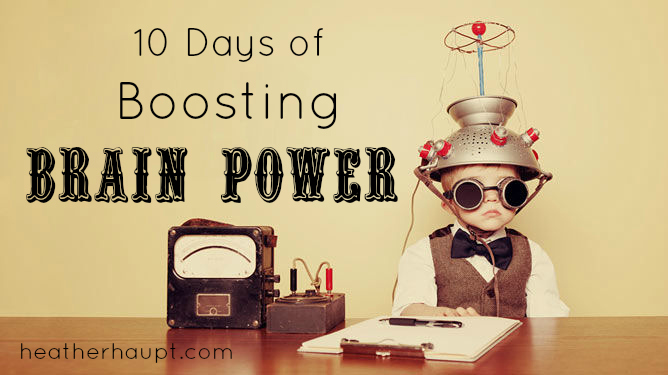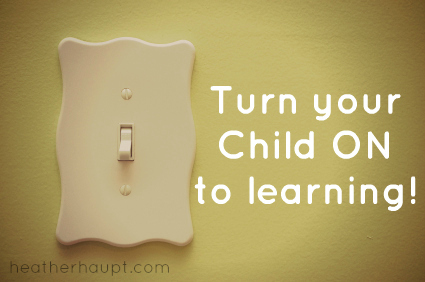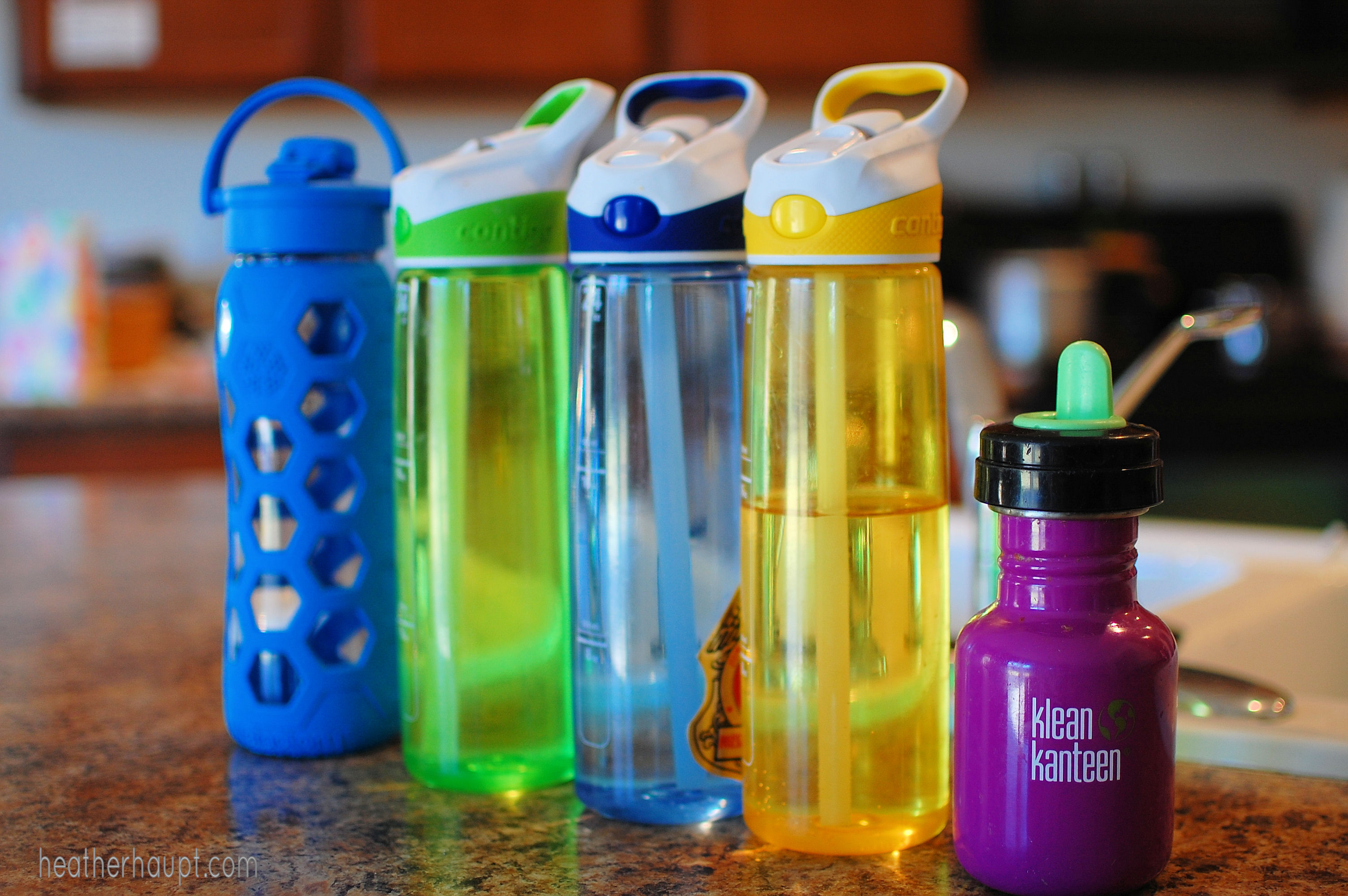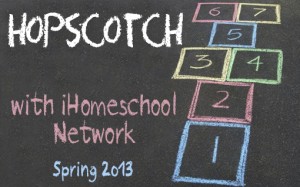
Isn’t that picture hilarious? I’m super excited to share with you over the next 10 days (M-F) tips and tricks to boosting brain power. And I have to warn you now, that it will actually look nothing remotely like what is pictured above!
But often times we think we need to do something ‘serious’ like this or cram more ‘book learnin’ into their heads to produce little genius’. I’m here to tell you that nothing could be further from the truth.
Or you could be pulling out your hair as you watch your bright son or daughter just sit staring vacantly with that ‘lights on, but no one is at home’ look when you know they are capable of understanding and mastering the material.
There are some important tips and tricks that you can easily incorporate into everyday learning to maximize your children’s learning potential. Over the next two weeks I’ll share some of these key tips to help turn your child ON to learning and help that learning STICK!

My fascination with how the brain works – specifically relating to learning, started about 12 years ago. But I benefitted from internalizing many of the tricks I’ll be sharing with you long before I had any research to back it up. I was an active girl and my own mother had to get creative when it came to helping me learn. Those skills I learned as a girl carried me through highschool and college. I didn’t get nearly all A’s while pursuing my biology degree because I’m some genius, but because my parents instilled in me a strong work ethic and gave me a host of tools to help even someone as active and distractible as me succeed.
Let’s start with FEEDING the Brain:
The brain is made up of neurons that fire and pass along messages. This ‘thinking’ is a costly activity and requires a lot of energy. If we want to preserve peak mental function, nourishing this very important organ is of utmost importance.
You can have an amazing lesson plan, with wonderful hands-on activities, engaging books, but if the brain hasn’t been properly nourished, all of your planning will go by the wayside.
So HOW Can We Give a Nutrition BOOST to the Brain?
WATER ~ One of the easiest ways to boost brain function is to ensure adequate water intake. The brain is made up of 85% water. Water is essential to help neural messages transmit. It aids in the delivery of nutrients and the removal of waste. Because the brain has no way to store water, mental symptoms of dehydration are some of the first to crop up. Have you ever noticed any of these in your children?
| Brain Fog | Afternoon Fatigue |
| Lack of Focus | Headaches |
| Emotional Outbursts | Exhaustion |
| Impaired Short-Term Memory Loss | Recall of Long-Term Memory |
I’ve recognized many of these in myself and also with my children. It is amazing how quickly those symptoms can abate when water intake is increased!
If you want to think faster, be more focused or experience greater clarity and creativity, be sure your brain is functioning on a full reserve of water!
It works, I promise! In fact, I was just reading about a study that came out last year that showed an increase in test scores among groups of college students that sipped water throughout the testing period. I found it interesting how the article pointed out several reasons for this in addition to the physical need for hydration.
Want to Boost Brain Power?
Make sure your kids drink a lot of water at the start of the day! I recommend a full glass first thing in the morning. In our family, we keep color-coded water bottles (Klean Kanteens and Contiga for them, Life Factory 22oz glass for me). They hold 24 oz of water. Our goal is to be 50% done by lunch and finished by dinner time at a miminum. I shoot for drinking between 60-90 oz/day. This works for us so that we have a visual of how much more water we need to drink each day. If there is a lot of physical exertion you’ll need to increase this amount however. Urine output should be nearly clear in someone who is well hydrated.
Food Matters
The foods we eat can also be very important for brain function. We need to be eating healthy fats, good lean protein and lots of fruits and veggies. This aids in the proper formation of brain cells, upkeep, protection from free radicals and providing a source of energy. Bad fats (trans fats and saturated fats), preservatives, and simple carbohydrates, replace good building blocks in the brain and elsewhere and can also result in a yo-yo effect of fuel delivery.
A sugary breakfast in the morning leads to a rapid rise in blood sugar, but then a subsequent crash. Without glucose in the blood, your brain will have nothing to feed on. The brain needs a steady supply of fuel in order to function well. Eating complex carbohydrates that will lead to a slow release in the blood stream will help prevent this mid-morning crash.
So there are my first tips. Keep HYDRATED and feed your kids nutritious meals. It makes a difference!
How do you encourage your kids to drink enough water or encourage nutritious eating habits?
Related Post:
10 Tips for Helping Your Picky Eater
10 Days of Boosting Brainpower Series
Day 1: Boosting Brain Power Starts with Food and Water
Day 2: How Sleep Makes Us Smarter
Day 3: Exercise Boosts Brain Power
Day 5: Active Play Boosts Brain Power
Day 6: How to Waste Brain Boosting Opportunity
Day 7: Brain Breaks: An Important Tool in Your Homeschool
Day 8: The Role Music Plays in Boosting Brain Power
Day 9: Engaging the Senses Boosts Brain Power
Day 10: How to Turn Passive Learning into Active Learning
Be sure to check out what some of the other homeschool related topics being addressed during this 10 day Homeschool Hopscotch!
affiliate links included. see disclosure.




I like it when people come together and share ideas. Great website, continue the good work!
Nice article… having a great information regarding to the boost baby brain..Pomegranates is also a great source for boost your baby brain.. Red winter fruit is very good for your child and is rich in resveratrol which protects the brain in the later stages and reduces dementia stroke.
Hi,
I am researching and implementing many of these techniques in my classroom, but I am currently in an Ed, Research class and writing a research proposal about this very topic. I am looking for peer reviewed journal articles or books about this topic, any information that you would be able to send me would be greatly appreciated!! I currently teach second grade and am in great need of many of these techniques! Thanks!!
I don’t have access to my files right now, but two books come to mind that have been well researched and refer to a plethora of peer-reviewed journal articles. Brain Rules (http://amzn.to/1foXFpS) and Smart Moves (http://amzn.to/15gZx2a). Hope this helps and good luck with your research project. It truly is a fascinating topic and your students are blessed because of your knowledge in this area.
When will day 10 be posted. I am enjoying these and passing your website to my adult children.
I’m so glad you have enjoyed this series. That was an oversight on my part to not link to the final installment. I’ve fixed that now. You can read Day 10 here: https://www.heatherhaupt.com/2013/04/26/how-to-turn-passive-learning-into-active-learning/
I like the idea of having color-coded water bottles! Aside from encouraging your family to regularly drink you can also keep track of their water intake per day. I’ll do the same!
Good points! I have pretty much stopped serving any kind of cold cereal for breakfast around here, because I notice that the kids are hungry again before I can even put the breakfast dishes away! Total waste of effort. For myself, I stopped eating cereal years ago because I discovered that it (and other grain-based foods) were the cause of my fatigue problems. I would eat cereal in the morning, feel great for about 20 minutes, and then crash and deal with horrible fatigue until sometime in the afternoon. Now that I’m eating better (eggs!), my fatigue is only 10-20% of what it used to be. Food and water are SO important! (Though I really have to focus on that for myself, because I’m so busy as a homeschool mom!!)
That is so interesting. I’m the same way with cold cereal. I can’t even do oatmeal unless I add some kind of protein to it. My kids do great though with oatmeal or granola.
Water is hard. That’s why I try to set goals for myself. I’m the worst over here too.
This is really wonderful! I love the water goal. We need to work on that! Thanks for sharing and I look forward to this series!
Hi Heather. So excited to read this series. I love the idea of getting a different colored water bottle for each child. I’ve been thinking about doing that for some time but… We have been pretty good about diet but as I think about it, we are definitely slipping some. Gotta go and get some water!
We do well and then start to slide too. I try to keep good articles handy to remind myself ‘why’ we need to eat healthy or ‘why’ we need to keep our water intake up. For me, anyways, knowing the why goes a long way!
Great post! I need to get a copy of this book. My son loves learning about what is good for him to eat then he will look for it at the grocery store. I think he would love reading it! How much water do your kids drink in a day? I need to get a better water bottle for my son so he can get his water himself!
We shoot for a minimum of 24 ounces/day for the boys.